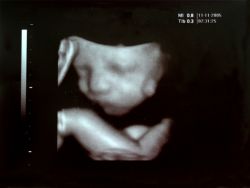
Pregnancy Advice & Help
Confirming Your Pregnancy

You can confirm your pregnancy, where your period is a day or more overdue, by carrying out a simple home pregnancy test. Kits for these tests can be bought at your chemist and the procedure takes only a few minutes.
If the test indicates you are pregnant, make an appointment to visit your GP or local midwife to start your antenatal care. They will give you an Estimated Date of Delivery (EDD). The date of delivery is calculated as 40 weeks from the first day of your last period. However, this date is only an estimate and many babies are born in the two weeks before or after the EDD (only five percent of babies arrive on their EDD).
Antenatal Care
Once your pregnancy has been confirmed by your GP or midwife, you will be given your first antenatal (or 'Booking In') appointment - probably with the midwife who will monitor your pregnancy. Ongoing care may be divided between the community midwife and/or your GP and/or hospital antenatal clinic, depending on the development of your pregnancy, your own choice and the care available in your area.
Your first antenatal appointment will probably take place between the eighth and twelfth weeks of your pregnancy. Your GP or midwife will discuss your medical history with you to see whether there are any issues of which they should be aware; they will also check your blood pressure, take a blood and urine sample, weigh and measure you and offer you an ultrasound. Use this opportunity to ask any questions you might have - your GP or midwife will be happy to talk to you, and it will enrich your experience in those first weeks as parents to have the support of a GP or midwife that you trust.
It goes without saying that antenatal appointments are important and should be kept so that any problems can be recognised at an early stage. However, if you are in good health, you should not need more than eight to ten antenatal visits - usually one a month until 28 to 32 weeks, then one a fortnight until 36 weeks and one a week after that. You may be offered fewer appointments in subsequent pregnancies.
As a matter of routine, you will be asked to give a blood test at your first antenatal appointment. This test determines your blood group and whether or not your blood is Rhesus negative or positive. If you are Rhesus negative, you will be offered Anti-D injections at 28 and 34 weeks of pregnancy, as well as after the birth of your baby. This injection is safe for you and the baby.
The first blood test also checks for things such as anaemia, immunity to rubella (German measles), sexually transmitted diseases, Hepatitis B and may include a check for HIV (subject to your permission). You will also be asked for a urine sample which, among other things, will be used to check for diabetes and protein (a possible warning sign for pre-eclampsia). You may be asked to bring a urine sample to each antenatal visit, when a further blood sample will probably be taken between 28 and 36 weeks to test for anaemia, gestational diabetes and antibodies in women who are Rhesus Negative.
Other routine checks include listening to your baby's heartbeat and discussing its movements, checks for swelling, and questions about your health and feelings. You may be given your notes to look after by your midwife - it is important to bring them to every appointment and ask if there is anything in them that you don't understand.
Antenatal Tests

Ultrasound scan: you are likely to be offered two NHS ultrasound scans during your pregnancy; these are completely painless and safe. The dating scan to confirm your EDD will take place between approximately 10 to 14 weeks. At 18 to 21 weeks, you will have an anomaly scan, which is to check that the baby is developing properly. Additional scans may be advised if considered necessary. The number of scans offered may vary depending on where you live.
It may be possible to find out the sex of your baby at the anomaly scan because its genitalia should be defined enough to see on the scan (if the baby cooperates and is in the right position!). You should ask the sonographer if you are keen to find out the sex of the baby prior to the birth. Some Primary Care Trusts have a blanket policy to refuse to disclose the sex of a baby, in which case you may be able to arrange a gender scan through a private organisation instead.
Most hospitals will provide one or two scan pictures for you to take home as a memento of your pregnancy. There may be a small charge or you may be asked to give a small donation towards the print costs. Scan pictures can fade in sunlight if you frame the originals, so it's worth scanning the pictures in to your computer and framing a copy.
3D/4D scans: these remarkable scans produce either a 3D picture of your unborn baby or, in the case of a 4D scan, allow you to see your baby in 3D in real-time. Generally, these scans can be arranged through private organisations operating across the country and the cost will vary depending on the service on offer (it's wise to find out exactly what you will be paying for in advance). These scans give parents the pleasure of seeing their baby in the womb rather than being used for medical screening purposes. 4D scan packages often include a DVD of the scan and a CD of still images for you to keep.
Non-Invasive Prenatal Test (NIPT)
NIPT will be added to the existing NHS screening program for Down's Syndrome, Edward's Syndrome and Patau's Syndrome as part of the evaluated rollout from June 2021. NIPT will be offered to women who receive a higher chance result from a combined or quadruple test.
NIPT uses a blood sample from the mother to analyse DNA from the placenta for certain chromosome conditions that could affect the baby's health. NIPT has far fewer false positive and false negative results than nuchal screening or the Quad test. (Quad test is a quadruple blood screening test between 14 and 20 weeks).
The NIPT test can be performed from 10 weeks, before this it is difficult to collect enough cell-free DNA. Results can take up to 10 weeks. It does not give you a definite yes or no answer, it just gives a probability. It is not currently offered routinely in the NHS. Some hospitals have the option for high risk cases, but mainly it is only available at private clinics and cost upwards of £350.
Down's syndrome, Edward's syndrome and Patau's syndrome
These screening test should be carefully considered before the scan appointment. You do have a choice, you can decide to not have these test. If you do choose to have this test it is called the combined test as it combines an ultrasound scan with blood tests. The combined test is carried out at around 10-14 weeks into your pregnancy.
You will have a sample of blood taken and an ultrasound scan. This scan can be done at the same time as your dating scan. At the scan the fluid at the back of your baby neck is measured to determine the nuchal translucency. As well as your age and the information from these tests they can work out the chance of your baby's having Down's, Edward's or Patau's syndromes.
If it is not possible to gain a nuchal translucency measurement either because of the baby's position or you are too far along in your pregnancy then the alternative is a quadruple test. This can be carried out between 14 and 20 weeks of pregnancy, (This test is only available for Down's syndrome and it is not as accurate as the combined test). The quadruple blood test screening measures four different substances in the maternal blood and is similar in performance to the combined test. For Edward's and Patau's syndromes, if your too far along into your pregnancy to have the combined test then you will be offered a mid- pregnancy scan. At this scan they will look for physical abnormalities and 11 other rare conditions.
The results of these screenings are generally presented as a risk figure, like 1 in 150. The current thinking is to recommend an invasive test if the risk is higher than 1 in 150. If thereis a high risk from the screenings tests then you can choose to have a diagnostic test called 'Chorionic Villus Sample' (CVS), this test is done between 11 and 14 weeks of pregnancy. A tiny sample of tissue is taken from the placenta and the cells from this are tested. Between15 and 20 weeks of pregnancy then an amniocentesis can be done but you can have it after 20 weeks if necessary.
They will collect a small sample of fluid that is surrounding the baby, this contains cells from your baby and these cells are tested. These tests are very similar in that they use a fine needle to take a sample from the pregnancy (either placental or amniotic fluid) both have a small increased risk of miscarriage of around 1% compared with the background rate. Usually if test shows a lower chance result then you should be notified within two weeks, if the test shows a higher chance result then you will be notified within 3 working days. Talk to your midwife about what happens in your area and when you can expect to receive your results. You will be offered an appointment to discuss the results and what options you have available to you.
Other Special Tests
During your antenatal appointments all women are asked if they want to be screened for addition conditions when your bloods are being taken. Sickle Cell Disease (SCD) and Thalassaemia: These conditions are hereditary and affect only certain sections of the population. If you are in one of those sections, then you will be offered the appropriate tests.
Screening for Sickle Cell Anaemia and Thalassaemia should be offered to all women ideally as early as 10 weeks. If you or your partner have sickle cell disease and are currently planning a family, ask your GP to refer you to a genetic counsellor. All babies are screened for sickle cell disease using the heel prick test.
Cystic Fibrosis: If you have a history of cystic fibrosis in yours or your partners family then you may choose to get a carrier test. After birth all babies are screened for cystic fibrosis using the heal prick test. The heel prick test will also find out if your baby has 1 of 9 rare conditions and is carried out when the baby is around 5 days old.
Further information:
Childcare Advice
Employment, Finances & Benefits
Health & Lifestyle
Illness, First Aid & Immunisations
Parenthood Advice
Postnatal Depression
Pregnancy Advice
Relationship Difficulties
Useful Contacts
